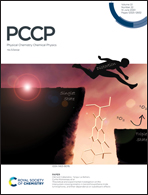Bi-stimuli assisted engineering and control of magnetic phase in monolayer CrOCl†
Abstract
Magnetic phase control and room temperature magnetic stability in two-dimensional (2D) materials are indispensable for realising advanced spintronic and magneto-electronic functions. Our current work employs first-principles calculations to comprehensively study the magnetic behaviour of 2D CrOCl, uncovering the impact of strain and electric field on the material. Our studies have revealed that uniaxial strain leads to the feasibility of room temperature ferromagnetism in the layer and also detected the occurrence of a ferromagnetic → antiferromagnetic phase transition in the system, which is anisotropic along the armchair and zigzag directions. Beyond such a strain effect, the coupling of strain and electric field leads to a remarkable enhancement of the Curie temperature (Tc) ∼ 450 K in CrOCl. These predictions based on our detailed simulations show the prospect of multi-stimuli magnetic phase control, which could have great significance for realizing magneto-mechanical sensors.



 Please wait while we load your content...
Please wait while we load your content...